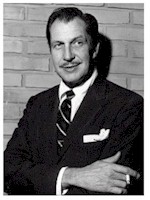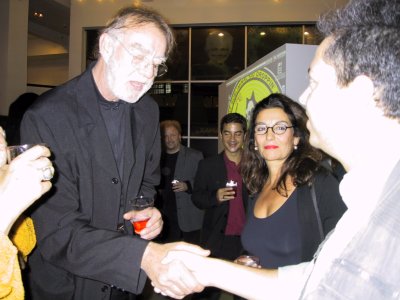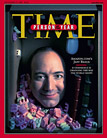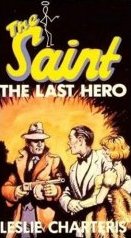Meh.
Author: bobg
Ibid: Incremental backups to infinite disk
Well now you can save the lame excuses for why you don’t floss. I’ve written ibid, a simple tool for performing incremental backups on Linux and Unix-like systems — possibly also Mac OS X, I haven’t checked yet. And who knows, maybe it can even be made to run under Windows.
Incremental backups
An incremental backup is a backup of just those files that have changed since the last backup.
Many people use mirroring for backups, periodically duplicating essential files to some destination, such as a spare external hard drive, replacing those copies with fresh copies on each backup. This approach is economical in terms of the storage space used, but it only allows you to restore the latest version of a given file. If you have a file called my_novel.doc and you mirror it to a spare hard drive, then you accidentally delete half of it but don’t notice until after the next time you mirror it to that hard drive, then the pre-accident version of my_novel.doc is gone forever.
With a true backup system like ibid, the pre-accident backup copy of my_novel.doc still exists; the post-accident backup copy is separate. The main drawback to this safer approach, of course, is that the more backups you do, the more space you need.
For a long time I used a makeshift system that backed up files to blank CDs or DVDs, but it was slow and difficult to use and it required my constant attendance (for swapping discs in and out) and very often the disc burner would crap out at the last minute after half an hour of burning and produce an unreadable disc. I didn’t trust the archives that I created with this system; it was annoying to have to render botched discs unreadable with scissors all the time (for privacy reasons); and the more backups I did, the more crowded with discs my safe-deposit box got.
Then I discovered Jungledisk, a commercial “infinite filesystem” service that’s easy to use and has good privacy and security features, not to mention reasonable fees. In conjunction with davfs it can be made to act just like a mounted filesystem.
Ibid doesn’t care if you’re using Jungledisk or some other destination service or media. It simply copies the files you ask for to the target directory tree. The backed-up copies are just plain files residing under their original names in a plain filesystem, so retrieving old data is simple.
Here are ibid’s other main features:
- Written as a single Perl file, no complicated build/install process;
- Limit sessions by size;
- Exclude files and directories by pattern (using Perl “regular expressions”);
- Files with multiple “hard links” stored only once — link names stored separately;
- Files re-backed up when they change;
- Files not re-backed up if they’re merely renamed (the new name is stored separately);
- Can run unattended, and even at automated intervals (e.g. via cron).
You can download it here. At some point soon perhaps I will create a proper website for it, at which time I will update this blog post with the new information; meanwhile, this is the definitive home of ibid (and I will keep the copy at the above link up to date with bugfixes and other changes).
Here is the documentation for ibid.
Continue reading “Ibid: Incremental backups to infinite disk”
Greatest hits: White House orgy
[Reproduced from e-mail.]
All presidents have taken long vacations, but then again, they are “on-call” 24 hours per day […]
With, of course, the notable exception of President Clinton, who preferred have his vacations under his desk.
So I wrote:
New rule: Any president who can keep Americans safe, preserve our liberties, keep joblessness and poverty down, keep the economy growing, keep the international situation stable, heed scientific consensus, avoid burdening our children with debt or depriving them of resources, refrain from unnecessary military adventures and fight the necessary ones effectively, govern on behalf of those who didn’t vote for him as well as those who did, appoint qualified experts to top posts and hold them accountable when they fuck up, admit and correct his own errors, honor the accomplishments of past generations, and exhibit a deep respect for the law is hereby free to gather the entire staff of the White House for a giant orgy in the Oval Office daily at 6pm. With sodomy.
Why I owe Adam Stoller three apologies
Adam kept trying to interest me in XPilot, a space-battle game; but I found it confusing and could never get interested in it. Years later I became a huge XPilot fan. I’ve even contributed several new features.
Sushispicion
American pop culture regarded sushi askance during my formative years.
In a 1978 episode of Columbo, “Murder Under Glass” [directed by Jonathan Demme!], chef Louis Jourdan serves a special sushi meal to a visiting Japanese dignitary, who exclaims, “Fugu sashimi — in Los Angeles!”
In The Breakfast Club (1985) there’s this exchange between Judd Nelson and Molly Ringwald: “What’s that?” “Sushi.” “Sushi?” “Rice, raw fish, and seaweed.” “You won’t accept a guy’s tongue in your mouth, and you’re going to eat that?”
And from Desperately Seeking Susan that same year: “Now you have these sushi restaurants. Everyone goes for sushi.” “Sushi… I hate the stuff.” “Although, I tell you, I had some the other day. I took it home, I cooked it, it wasn’t bad. It tasted like fish.”
Adam was also known for his abiding love of sushi. At that time, sushi hadn’t permeated American culture to the extent that it has now. I found the mere idea of eating raw fish to be repellent, and never hesitated to say so to Adam — perhaps even cruelly. Now hardly a day goes by that I don’t crave a meal of sushi.
Once, after a considerable research effort, Adam tried to convince the ITC to switch from using RCS for source code control to using CVS. CVS was fairly new at the time, and I was among those who were distrustful of CVS’s fundamentally different approach than that of RCS. It didn’t require files to be locked before being edited; instead, if two developers edited the same file at the same time, they were later obliged to use a dubious merging algorithm to resolve any conflicts that may have arisen. Collectively we defeated Adam’s proposal and continued using RCS. Within a few years, though, CVS became the de facto standard for source code control in organizations with multiple software developers; no one even considered using RCS anymore. I’ve even contributed some bugfixes to CVS.
Adam, you were right about so many things, and I was wrong.
Vincent Price in… Plea From The Saint!
 No sooner did I write my blog post, “Us and Them,” on Friday — which, though it didn’t come right out and say so, was in part a screed against prejudice — than I happened to hear a much more eloquent plea about tolerance from none other than Vincent Price.
No sooner did I write my blog post, “Us and Them,” on Friday — which, though it didn’t come right out and say so, was in part a screed against prejudice — than I happened to hear a much more eloquent plea about tolerance from none other than Vincent Price.
It came at the end of a radio episode of The Adventures of The Saint circa 1950, one of several that I discovered online last week.
Few people know The Saint as anything other than the Roger Moore TV show from the 1960’s, or the forgettable Val Kilmer film from 1997. But the character was created in his first (and best) form in a series of pulp adventure stories by author Leslie Charteris starting in 1928. In high school and college I devoured every Saint story I could find. Although in later years The Saint became a more conventional kind of detective/spy character, in his first decade or so he was much more like Errol Flynn in The Adventures of Robin Hood — battling (and often profiting from) criminals, crooked politicians, evil industrialists, war profiteers, and their ilk with a unique and hugely entertaining style. (Indeed, the radio show announcer presents The Saint as “The Robin Hood of modern crime.”) You might not have thought it possible to set a swashbuckling adventure in the streets of 1930’s London, but that’s exactly what Charteris did.
Of the radio episodes I’ve heard so far, a couple are typical murder mysteries, but one (“Death of the Saint”) retains the “gay adventurer” flavor of the early Saint stories. (How I lament the loss of the old meaning of “gay.” No other word quite captures what “gay” used to mean. There’s “carefree” and “insouciant,” but those sound so, well, gay.) Vincent Price is excellent throughout, making easy work of the wordy banter that is one of the great pleasures of Saint stories; plus it’s fun to hear the mid-20th-century state of the art of what is now an all but defunct art form.
Price arranged to deliver a public-service message at the ends of some of his shows. One was on behalf of the Red Cross’s then-fledgling blood program. The following came at the end of the episode, “Author of Murder,” about a poisoning plot. Tinged though it is with nascent red-menace language, it is still relevant, and I found it particularly remarkable. It was not sponsored by any corporation nor was it government propaganda; no standards-and-practices board mandated its inclusion. It appears just to have been what was on Vincent Price’s mind at the time. Can you imagine if today’s TV stars used their shows as platforms to discuss their own civic-minded causes?
Ladies and gentlemen, poison doesn’t always come in bottles. And it isn’t always marked with the skull and crossbones of danger. Poison can take the form of words and phrases and acts: the venom of racial and religious hatred. Here in the United States, perhaps more than ever before, we must learn to recognize the poison of prejudice and to discover the antidote to its dangerous effects. Evidences of racial and religious hatred in our country place a potent weapon in the hands of our enemies, providing them with the ammunition of criticism. Moreover, group hatred menaces the entire fabric of democratic life. As for the antidote: you can fight prejudice, first by recognizing it for what it is, and second by actively accepting or rejecting people on their individual worth, and by speaking up against prejudice and for understanding. Remember, freedom and prejudice can’t exist side by side. If you choose freedom, fight prejudice.
Us and them
A short time ago I went to get some lunch at the Palo Alto Mollie Stone’s, a supermarket that happens to draw many neighborhood Jews because they stock plenty of Jewish products (like challah bread, yahrzeit candles, and matzo meal), or perhaps they stock plenty of Jewish products because they draw many neighborhood Jews.
 Outside the supermarket, a Chabad Jew stood in his recognizable black suit and fedora with a lulav (a bundle of branches) and an etrog (citron). As I passed to enter the store he asked if I’m Jewish.
Outside the supermarket, a Chabad Jew stood in his recognizable black suit and fedora with a lulav (a bundle of branches) and an etrog (citron). As I passed to enter the store he asked if I’m Jewish.
At any other time I probably would have brushed him off with a wave of my hand and a mumbled apology. But in the past few days I’ve traded e-mail with Sarah reminiscing about (a) my bar mitzvah and (b) the time in 1980 when she convinced her mom to let her skip school (in order to accompany me to the premiere of The Empire Strikes Back) on the grounds that it was the Jewish holiday Shavuot. (Sarah is Irish.)
So I stopped and told the Chabad guy, “Yes.” He reminded me it’s now the last day of Sukkot and asked whether I’d “waved the lulav” yet.
Now, around the time of my bar mitzvah I was very involved with my religion, in large part because of the mentoring and encouragement of my rabbi, Rabbi Ungar, a real mensch. But not long after my bar mitzvah he moved across the country and we got a new rabbi who was a zero in the personality department, and my interest in the religious aspects of Judaism (as opposed to the cultural) waned.
At any rate, even with my long-ago immersion in Judaism I had no recollection of what it meant to “wave the lulav.” I accepted the man’s invitation to step inside a makeshift sukkah where I donned a yarmulke, took hold of the lulav and etrog, repeated some blessings in Hebrew at his prompting, and waved the items right, left, foward, backward, and up and down (signifying God is everywhere). It felt good to perform the ritual.
He asked whether I had a place to go for Simchat Torah, the joyous holiday that begins tonight when Sukkot ends. I declined his invitation to visit the local Chabad temple, since I live pretty far from Palo Alto, but when he urged me to find someplace near home to celebrate with other Jews I told him I would, and I meant it.
That feeling lasted for about a minute after I thanked him and entered the store to forage for lunch. I realized that I had again fallen under the spell of tribalism, the powerful emotion that comes from being in a group where you feel like you belong (and where, crucially, there are others who don’t). This emotion — which is what makes cults, gangs, and wars work, among other things — blows right past the intellect and latches firmly onto the hindbrain, where only deeply ingrained habits of rational thought can dislodge it.
During my visit to Israel in the 1990’s for the wedding of my friend Chuck, I was in the grip of tribalism for almost a whole week. No matter that I was in a very strange, very foreign place; the sensation of belonging was all-consuming. (It was that same warm feeling that got me out of bed on Saturday mornings to attend Shabbat services when I was 12 and 13.) I was certain I wanted nothing more to do with America and wanted instead to live in Israel. I talked this over with other American expatriates I met there, trying out different theories of what was making me feel that way: America’s short history vs. Israel’s long one (counting more than just the modern state of Israel, of course)? The sense of pioneering a young nation that pervades Israeli society? The stated need of a nation of my fellows for young people with skills like mine?
Ah, but what makes them my fellows — a slightly closer genetic relationship than I have to most other people? A bit more common heritage? Why do those things matter? It doesn’t mean that any particular Israeli is more or less likely than any particular American, German, Russian, or Thai to be a jerk I’d rather avoid, or to be someone I’d like to pal around with. In fact doesn’t it enrich me more to surround myself with people who are less like me than more like me?
The interminable flight back across the Atlantic cured me of the tribal feeling. I resented that it was able to hijack my brain for the duration of my trip. By the time the plane touched down in New York City — the melting pot — I remembered why I prefer being an American: I am uncomfortable ruling anyone out of belonging to my group. I am diminished if I divide the world into “us” and “them.”
Obviously I am still vulnerable to feelings of tribalism despite being suspicious of them, and that only makes me more suspicious of them. Because when my rational mind is in control, I prefer the philosophy described by Thomas Paine: “My country is the world and my religion is to do good.”
Cats cause war
The single-cell parasite Toxoplasma gondii is remarkable. It can only reproduce in cats, so it has evolved the ability to control the minds of rats. That’s right, rats. When a cat poops and a rat eats it, any T. gondii that the rat ingests go to work on the little rat brain, suppressing its normal levels of caution and making it act more fearlessly — in fact the rat may specifically seek out areas that a cat has marked with its urine. This makes it easier for the rat to be caught and eaten by a cat! …Where the T. gondii can then reproduce and begin the cycle anew.
T. gondii can live in people, too; it just can’t reproduce in us. About a third of all Americans are infected with this parasite. Some weeks ago my work friend CJ highlighted in her blog some new research suggesting that T. gondii affects human personalities too, not just rodent personalities, and it does so in a gender-specific way. She writes:
Here’s what it does to men:
- makes men appear more macho
- makes men stupider
- makes men fear uncertainty
- makes men fear novelty
- lowers men’s “superego strength” (disregards rules, expedient, shortened attention span, less responsible).
I.e. Toxoplasma Gondii turns men into neo-conservatives.
Now comes this item via BoingBoing:
A common cat parasite that can easily infect humans causes women to give birth to more boys than girls.
…and as I remember once reading, studies have shown that a too-high ratio of boys (in a certain age range, 15-35 I seem to recall) predisposes societies to war.
 So thanks for nothing, cats. I always suspected you were the enemy, now I’m sure. Of course I can’t be certain whether that’s my own opinion or whether I’m under the control of a dog parasite from Alex.
So thanks for nothing, cats. I always suspected you were the enemy, now I’m sure. Of course I can’t be certain whether that’s my own opinion or whether I’m under the control of a dog parasite from Alex.
Crazy life
In my freshman year of college there was just one tiny TV in my dorm. I don’t remember whose room it was in, but one night I was in that room with my stoner friends George and Merle. I’d had a couple of tokes myself and was feeling mellow. We longed to find something to watch on TV so we started flipping channels. I think we thought it would be a goof to find a kid’s cartoon or some other innocent program to view while high.
Our channel flipping halted by unanimous acclamation on something wholly different (and much better suited for our altered state): a riveting closeup of a rocket lifting off in extreme slow motion. Chunks of ice fell from the rocket body as slowly as snowflakes. Panel seams flexed and vibrated. It went on forever, the enormous main stage inching upward out of the frame. Then the rocket nozzles came into view, and even as drastically slowed down as the footage was, the flaming rocket exhaust that shot from those nozzles was still too fast for the eye to follow. Other equally miraculous scenes followed, one after another.
 As we learned when a pledge break interrupted our spellbound trance an hour later, we had happened upon a PBS airing of Koyaanisqatsi, a movie consisting of nothing but breathtaking cinematography and a hypnotic Philip Glass score. It provocatively juxtaposes scenes of unspoiled nature against scenes of human society and technology, variously speeding things up or (as in the case of the rocket launch) slowing them down. Its title comes from the Hopi language and means “crazy life” and “life out of balance” (among other similar meanings).
As we learned when a pledge break interrupted our spellbound trance an hour later, we had happened upon a PBS airing of Koyaanisqatsi, a movie consisting of nothing but breathtaking cinematography and a hypnotic Philip Glass score. It provocatively juxtaposes scenes of unspoiled nature against scenes of human society and technology, variously speeding things up or (as in the case of the rocket launch) slowing them down. Its title comes from the Hopi language and means “crazy life” and “life out of balance” (among other similar meanings).
It instantly joined the ranks of my favorite movies. A couple of years after this encounter, the repertory movie theater near my college (the late, lamented Pittsburgh Playhouse, not to be confused with the performing arts theater that now uses that name) serendipitously scheduled Koyaanisqatsi for my birthday, and I led a large contingent of friends across town for a viewing. When the Philip Glass choir sings “baah, baah, baah, baah” in the “Pruitt Igoe” section of the film, we sang, “Bob, Bob, Bob, Bob!”
 A couple of years after that, Andrea was at my apartment and we watched Koyaanisqatsi on video. It was the first movie we ever saw together. “And today, that woman is my wife.”
A couple of years after that, Andrea was at my apartment and we watched Koyaanisqatsi on video. It was the first movie we ever saw together. “And today, that woman is my wife.”
Fast-forward to 1999, the year of money. We learn that a release to DVD of Koyaanisqatsi is being held up by some legal entanglements, and that the film’s director, Godfrey Reggio, is trying to raise the funds to rescue it from ownership limbo. We think nothing of sending a $150 contribution, and in return we get a precious artifact: a private edition DVD of Koyaanisqatsi signed by the director.
Three years later, our son Jonah was born. We plan a big trip east to visit both families to coincide with my birthday and Jonah’s first “half-birthday.” Shortly before leaving California we receive an invitation (thanks to our contribution years earlier) to attend a private preview screening of Reggio’s final “Qatsi” film, Naqoyqatsi (which followed Koyaanisqatsi and Powaqqatsi) — in Manhattan, where we’re already planning to go — on October 9th, when we’re already planning to be there — on the Upper West Side, one block away from the apartment of my sister Suzanne’s friend, where she and the friend can babysit Jonah while we attend the screening and the gala reception afterward. Amazed by the way things work out, we attended both.

A culmination: I shake the hand of Godfrey Reggio
Naqoyqatsi was nothing to write home about. (Neither was Powaqatsi, except for the interesting trivia that Philip Glass ripped off some of his own music from that film to reuse in The Truman Show.) And the reception, while visually interesting — a lot of stark white decoration punctuated by hundreds of bright red glasses of Campari — was full of strivers and hangers-on, not the kind of scene that interested two exhausted new parents very much. But the walk to and from the reception, through West Side streets at nighttime, was magical, our first serene alone-together time after months of crazy life.
The end of the line
At the beginning of a publishing project, everyone’s busy and excited. Finished those revisions I asked for? How do the figures look for chapter 6? Any good marketing suggestions? Know some good reviewers who should receive preprints?
Then comes the excitement of opening the carton of author’s copies of the finished product; the even greater excitement of seeing the book on store shelves (hmm, not arranged prominently enough, here, let me just move this other book out of the way…); the satisfaction of depositing royalty checks for work long since finished; the joy of reading positive reviews; and above all, the exhilaration of occasionally being recognized and thanked by an admiring reader.
The audience for my book was small, but not too small for me to have experienced all of those celebrated rites of passage of book authors.
Now I’m experiencing the somewhat less-celebrated last rites of publishing: when sales have dwindled so far that they are outnumbered by returns from booksellers to the publisher. Behold, my latest royalty statement.

Yes, that’s negative one dollar and seventy-one cents in royalties. Ah well.
Greatest hits: Good King Bezos
The story so far: I co-founded the Internet Movie Database and accepted the award at the inaugural Webby Awards ceremony in 1997.
In 1998, the Webby Awards were held at the Exploratorium and we were nominated again. Andrea and I were joined by another IMDb teammate, Jon, who ventured north from L.A. for the show, which was bigger and swankier than the year before. We got “Nominee” t-shirts! And we won again. This time I was ready with a five-word acceptance speech: “You ain’t seen nothin’ yet!” (Ironically, it’s a movie misquote.)
 Soon after that, the IMDb was acquired by Amazon.com. Over the next couple of years, as Amazon’s stock price enjoyed its celebrated rocket ride, I joined the happy (but in the words of Beaker, “sadly temporary”) ranks of instant dot-com millionaires.
Soon after that, the IMDb was acquired by Amazon.com. Over the next couple of years, as Amazon’s stock price enjoyed its celebrated rocket ride, I joined the happy (but in the words of Beaker, “sadly temporary”) ranks of instant dot-com millionaires.
In 1999, the IMDb team leader, Col, came from England with his wife Karen for the biggest and swankiest Webby Awards yet, held at the Herbst Theater in San Francisco, with a gala reception afterward in the newly renovated City Hall complex in San Francisco. It was the “year of money” — the height of the dot-com boom — and the show was produced on a scale to rival the Academy Awards. (Something should have tipped us off that it was all transitory — for instance, the fact that the screaming groupies who greeted the arriving nominees as we strode along the red carpet were hired ringers.)
The IMDb won yet again for best film site — the only web site to three-peat at the Webbies! Col, Karen, Andrea, and I ran up on stage. Col’s five-word acceptance speech was, “I’m king of the World-Wide-Web!” Later, Amazon.com won for best commerce site; Col accepted that one too. At the very ritzy reception he insisted on carrying both trophies plus the one from the year before — I’d brought it for him to take home — which made a bulky but impressive display and brought us all plenty of attention.
Around that time, I also happened to be on an extended consulting contract with Amazon on behalf of my own e-mail startup, Zanshin. For several weeks I flew to Seattle each Sunday night and returned home on Friday. The contract was going so well that Amazon had made an offer to hire the whole company and relocate us to Seattle. (We ultimately turned down that offer, but only after considering it for a long while.)
 It was agreed that I would bring the new IMDb and Amazon trophies to Seattle on my next trip and deliver them to Amazon founder Jeff Bezos. Here’s the e-mail message I sent to some folks right after I completed that errand. Just a few weeks later he was on the cover of Time magazine as the 1999 Man of the Year.
It was agreed that I would bring the new IMDb and Amazon trophies to Seattle on my next trip and deliver them to Amazon founder Jeff Bezos. Here’s the e-mail message I sent to some folks right after I completed that errand. Just a few weeks later he was on the cover of Time magazine as the 1999 Man of the Year.
I just returned from my audience with Good King Bezos, where I dropped off Amazon.com’s two Webby trophies.
He was busy talking with a secretary when the time for my appointment arrived, but as soon as I poked my head into his office (he has no personal receptionist), he leaped out from behind his desk with his hand extended. I took it and shook.
He told me how amused he was by the comment in my e-mail requesting the meeting, where I said that I may become the first person to be acquired by Amazon twice. He asked whether I was now an employee, then noticed my green “contractor” badge. I very briefly explained the whole history to him, at some points causing him to blurt out his trademark boisterous, surprisingly loud laugh.
I unwrapped the trophies and said what a shame it was he didn’t go to the ceremony, but that if he had, his would have been the only recognizable face. Boisterous laugh. We spoke a bit about Col and what a press magnet he was while carrying around three trophies after the awards ceremony (boisterous laugh), and I told him about the female reporters’ flashing eyes (boisterous laugh) and the woman who commented, “You have three penises!” (Extremely boisterous laugh with backward stumble and doubling over.)
 He admired the attractive trophies, likening their design to DNA, and I pointed out that they’re each a single helix, so they’re more like RNA. This elicited another laugh, and I found myself thinking that [another CEO I knew] wouldn’t even get it if I said that to him, let alone find it funny.
He admired the attractive trophies, likening their design to DNA, and I pointed out that they’re each a single helix, so they’re more like RNA. This elicited another laugh, and I found myself thinking that [another CEO I knew] wouldn’t even get it if I said that to him, let alone find it funny.
He thanked me for helping to create and maintain the IMDb, and I thanked him for acquiring us. I said that between that, my book (which appears in Amazon’s catalog), the consulting gig, and the job offers, Amazon appears to have moved to the center of my universe in a surprisingly short time. Very boisterous laugh!
He then asked in all seriousness how he could help us reach a decision about accepting the job offers, and I told him very frankly that location is a big obstacle.
He said that he himself always liked making big moves, going back to when he was in elementary school, where he was not a nice kid. He believed he was smarter than everyone else and he frequently told them so. Everyone thought he was a jerk, so a major move always meant another chance “not to be a jerk this time.”
We thanked and congratulated each other again, shook hands, said what a pleasure it had been for each of us to meet the other, and then I left and he got back to work.
After getting back to my office, I looked in the mirror: distant gaze, beatific smile, (some) white hair — just like Charlton Heston coming down from the burning bush. Is Jeff B.’s personality that powerful? Or was I just really happy about the pizza I ate for lunch?

